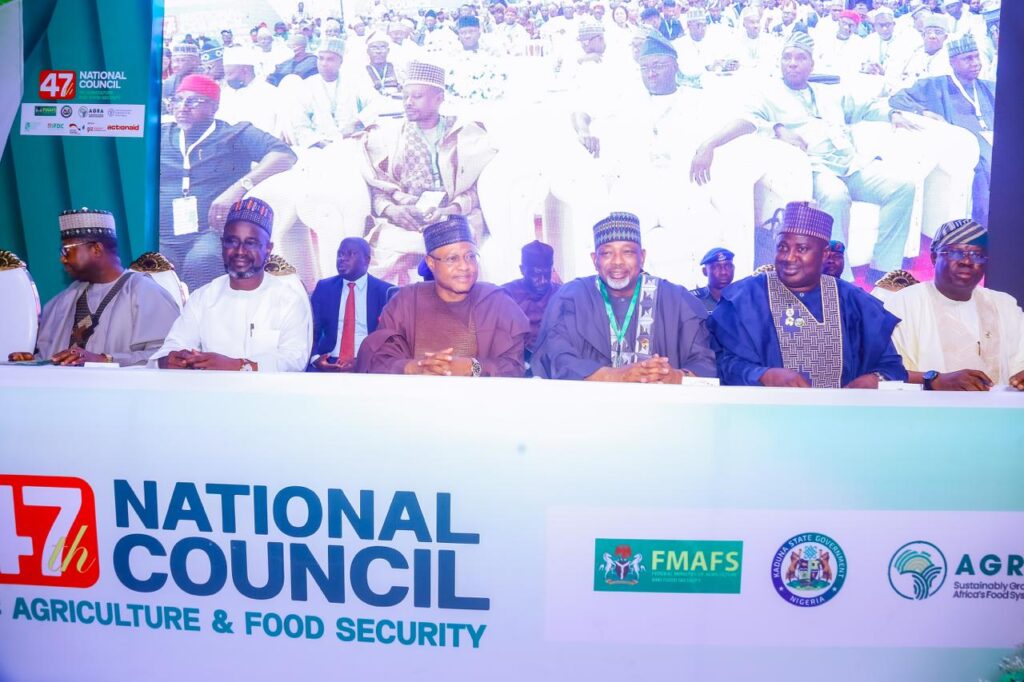By Atiku Sarki, Abuja
The Federal Government says it is intensifying efforts to improve food production and strengthen rural livelihoods through large-scale investments in infrastructure, mechanisation and climate-smart agriculture across the country.
The Minister of Agriculture and Food Security, Senator Abubakar Kyari, disclosed this on Thursday at the opening of the 47th National Council on Agriculture meeting in Kaduna.
Kyari said the ministry, in collaboration with state governments and development partners, is deploying feeder roads, solar-powered boreholes, mini-earth dams, water treatment plants and solar streetlights to boost market access and productivity in rural communities.
He said the government had also expanded support for agricultural cooperatives, rolled out the National Soil Health Initiative and promoted resilient seed varieties to mitigate climate risks and improve long-term food security.
“As we open the 47th Meeting of the National Council on Agriculture and Food Security, we do so with a shared determination to strengthen Nigeria’s food systems and deepen productivity,” he said.
The minister added that operations at National Strategic Grain Reserve Silos in Zamfara, Katsina, Nasarawa, Adamawa, Niger, Osun, Edo and Kwara states were being upgraded to improve distribution efficiency and stabilise prices.
Kyari highlighted major financing reforms undertaken this year, including President Bola Tinubu’s approval for the recapitalisation of the Bank of Agriculture with ₦1.5 trillion, alongside an additional ₦250 billion facility for smallholder farmers.
He said the Bank, in partnership with Heifer Nigeria, had launched the Renewed Hope National Agricultural Mechanisation Programme, a nationwide tractor-financing initiative targeted at farmers, youths and women.
“The programme will deliver training, maintenance services and fully equipped tractors through mechanisation hubs in all six geopolitical zones,” the minister said.
He noted that agriculture remains Nigeria’s single largest employer of labour and contributes more than a quarter of the nation’s GDP.
Reflecting on the meeting’s theme — “Food Sovereignty and Food Security: An Era of Renewed Hope” — Kyari said the Federal Government was determined to build a resilient food system anchored on local capacity, modernisation and inclusive growth.
“Mr President’s charge remains clear: our farmers must transition from hoes and cutlasses to tractors and harvesters. Food sufficiency is the first currency of national stability,” he added.
Also speaking, the Minister of State for Agriculture and Food Security, Dr Aliyu Sabi Abdullahi, said Nigeria must accelerate crop production levels for major staples including maize, wheat, sorghum, millet, soybeans, cassava, yam, potatoes and cowpea in order to achieve food self-sufficiency.
He urged stakeholders to deepen collaboration in tackling hunger, malnutrition and poverty, stressing that the meeting must produce concrete actions aligned with the President’s Renewed Hope Agenda.
Earlier, the Permanent Secretary of the Ministry, Dr Markus Ogunbiyi, described the National Council on Agriculture as the country’s highest coordination platform for agricultural policy, bringing together federal and state authorities, development partners and private-sector actors to harmonise strategies for national development.
“It is a moment for reflection, renewal and shared commitment,” he said.
